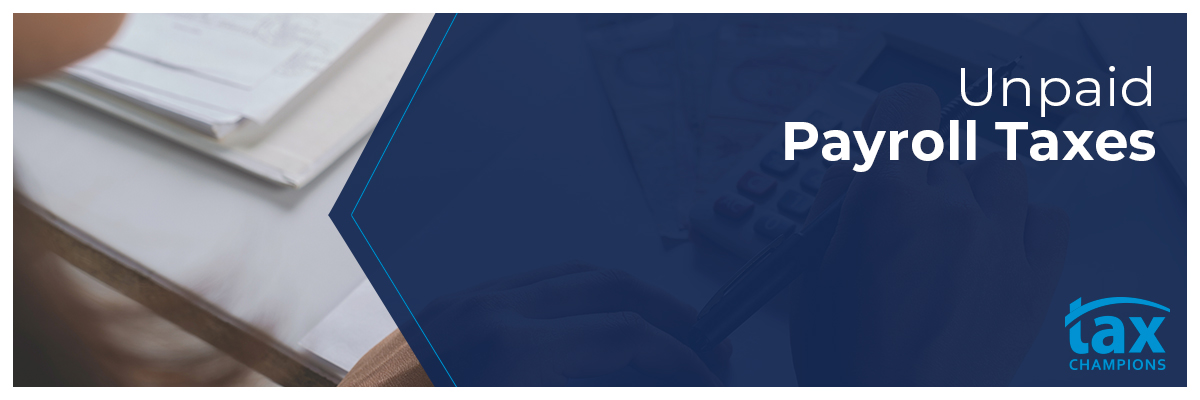Unpaid Payroll Taxes

Did you know that small businesses are a significant target for the IRS? They recognize small businesses as their largest source of uncollected revenue. This is largely due to unpaid payroll taxes, also known as employment taxes.
In fact, tax laws allow them to padlock the doors of the business, confiscate assets – including incoming payments and other revenue, and establish contact with the company’s clients.
In additional efforts to collect back taxes, the IRS has the legal right to collect the amount due from the personal accounts of some employees, corporate officers, and company shareholders.
According to the IRS, employment taxes consist of federal income tax, social security and Medicare taxes, and Federal Unemployment Tax, among others. Employers generally withhold them from their employees' paychecks. They then deposit these withholdings into a trust fund until the business makes their combined tax payments.
Trust Fund Recovery Penalty (TFRP)
If the business can’t pay the payroll taxes, the IRS may assess two penalties.
The first one is on the amount of the unpaid balance of the payroll taxes. The other is on the employee’s portion of the withheld FICA taxes and are equal to the unpaid employee taxes withheld. These penalties are collectible from individual taxpayers with particular roles within the business. (See more on that in the next section.) It's referred to as the Trust Fund Recovery Penalty (TFRP.)
The TFRP allows the IRS to collect the debt from an employee, shareholder, or a member of the board of trustees. That is to say if one of the following is true:
- the business a nonprofit organization,
- an individual is responsible for the company’s disbursement of funds,
- the taxpayer was the payroll service provider or one of its employees, or
- another professional employment organization or one of its employees.
If the IRS finds that any of these parties were willingly negligent in making the payments or were aware of the requirements of the law, but ignored them, they may hold them responsible for the unpaid payroll taxes. No intent of malice needs to be present for the IRS to assess the TFRP in these cases.
Case Example of Unpaid Payroll Taxes
If the IRS notifies you of a TFRP, then you have the right to appeal it. For example, here is the story of a case that went to court with favorable results.
Excel Academy, an Ohio-based not-for-profit private school is tax-exempt with a board of directors. David Bibler served as a volunteer in the role of treasurer. Consequently, he was required to sign checks, although he did not have authority to decide which bills to pay. The CEO made those decisions. In addition, the CEO handled the payroll and tax filings for the school.
The school closed in 2011. Payroll had lapsed, and other bills were due. This included almost $35,000 owed to the IRS in unpaid payroll taxes. Bibler and the rest of the board ordered the CEO to resolve the debt with the IRS. Shortly thereafter, Bibler signed checks to several other creditors.
In 2014, Bibler received a TFRP from the IRS.
Bibler appealed the decision citing that he’s not a responsible party. At first glance it may seem as if he’s the responsible party; however, in the end, the court disagreed.
Bibler’s defense was that he had genuine reason to believe that the taxes were being paid by the CEO. After all, the board of directors ordered the CEO to do so. Despite the fact that he had been signing checks to pay other creditors and none for the IRS, the court found in favor of Bibler.
Above all, they found no evidence that contradicted his belief that the CEO was resolving the tax issue with the IRS independently of the board.
erest.
Consequences of Unpaid Payroll Taxes
The IRS certainly takes unpaid taxes seriously. Therefore, the penalty for back payroll taxes is 100 percent. This is equal to the balance owed for employee taxes at the deadline. In other words, if a company owes $25,000 in unpaid payroll taxes, the penalty is $25,000.
An individual officer of the company isn’t always responsible for the full amount of the debt owed. In fact, it's common for the IRS to hold every responsible individual personally liable for equal portions of the balance, including penalties and interest.
The Journal of Accountancy explains the factors that point to whether a person is responsible for a company’s unpaid payroll taxes. The IRS examines the individual’s “power to compel or prohibit the allocation of funds”, authority to sign checks or make financial decisions, and control over the company’s payroll and tax returns.
In addition, they consider the person’s authority to hire and fire employees, whether they’re an officer or director of the company, and more.
As mentioned above, no intent of malice needs to be present for the IRS to determine that an individual willfully failed to deposit the payroll taxes. In other words, one can have the TFRP applied to him or her if the presumed knowledge that they weren’t paid is present.
Finally, the Journal of Accountancy says, “Courts have held that willfulness is present if a taxpayer knew of the nonpayment or recklessly disregarded whether the payments were being made.”
“This can be established by showing that the responsible person failed to assess and remedy the payroll tax deficiencies immediately upon learning of their existence” and neglected to remedy the failure.
What to Expect if You're Responsible for Unpaid Payroll Taxes
First, the IRS launches an internal investigation of the company's standard financial practices. They examine company contract signatures, bank signature cards, and more to gain comprehensive insight. This reveals the parties who are likely responsible.
If the IRS determines that you’re responsible for the unpaid payroll taxes of a company, they generate a letter that notifies you of your status. It states that you’ve been recognized as a responsible party and that you're a candidate for the TFRP.
The IRS allows a repeal of this determination if a response to the letter is received within 60 days – or 75 days if the letter is sent to you in another country.
The IRS also has the right to assert collection efforts on personal assets that aren’t related to the business. This can include a lien on personal property or a levy on personal bank accounts.
Aggressive collection efforts will commence on an individual taxpayer if the IRS is unable to collect the responsible party’s portion of the unpaid payroll taxes by the deadline expressed on the TFRP notice.
How to Protect Yourself From Unpaid Payroll Tax Collection Efforts
An IRS disruption of this magnitude is difficult for many small businesses and individual taxpayers, alike to survive. At Tax Champions, our licensed and experienced tax professionals are adept at navigating the options available to resolving payroll tax debt for the least liability possible.
As your trusted tax experts, we strive to maximize our 35 years of experience by matching our clients to the most effective program available to them.
Our hope is that you indeed sleep better at night knowing further collection efforts have been abandoned during our negotiations. Give us a call today for a free consultation with no high-pressure sales pitch or obligation to hire our firm.
Our knowledgeable tax professionals will confidentially discuss the circumstances of your matter to determine your best options.
As a result, if you decide that our firm is a good match for your needs, we’ll happily get started right away. Our staff is available seven days a week during the day and evening hours for your convenience. Reach us at 888.518.8964 or submit your contact information to us in the blue box on the right side of this page. We’ll reach out to you as soon as possible.
We’ll exhaust every avenue to disprove your liability of unpaid payroll taxes. If you are, in fact, responsible for them, we’ll negotiate the lowest terms that you qualify for with the IRS. We'll also work to establish an affordable installment agreement. As your trusted tax relief experts, we'll do what it takes to bring your account back into compliance with the IRS. Call now.
Sources
[1] 26 U.S. Code § 6672 - Failure to collect and pay over tax or attempt to evade or defeat tax. (n.d.). Retrieved from //www.law.cornell.edu/uscode/text/26/6672
[2] Employment Taxes. (2019, May 3). Retrieved from //www.irs.gov/businesses/small-businesses-self-employed/employment-taxes
[3] Employment Taxes and the Trust Fund Recovery Penalty TFRP: Internal Revenue Service. (2019, March 2). Retrieved from //www.irs.gov/businesses/small-businesses-self-employed/employment-taxes-and-the-trust-fund-recovery-penalty-tfrp
[4] The consequences of willful failure to pay payroll taxes. (2014, June 01). Retrieved from //www.journalofaccountancy.com/issues/2014/jun/20149645.html
[5] Volunteer board member of not-for-profit may assert reasonable cause for unpaid payroll taxes. (2018, August 01). Retrieved from //www.journalofaccountancy.com/issues/2018/aug/reasonable-cause-unpaid-payroll-taxes.html
